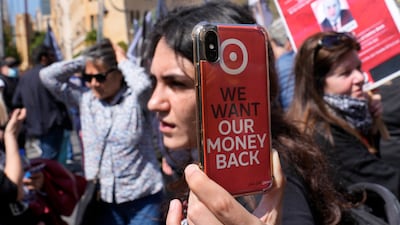The International Monetary Fund said on Thursday that Lebanon's monetary and fiscal reforms are insufficient for recovery as the country remains mired in a deep economic crisis that has lasted more than five years.
“The undressed economic crisis continues to weigh heavily on Lebanon's population”, said Ernesto Ramirez Rigo, the head of the IMF mission visiting Lebanon, in a statement.
Lebanon's economic crisis erupted in 2019, when the system completely collapsed after decades of public funds being squandered in what was later described as a “Ponzi scheme”. It has resulted in more than $70 billion in financial losses and a 95 per cent devaluation of the national currency.
Since 2022, Lebanon has reached what the World Bank described as a “temporary bottom”, with the volatile exchange rate temporarily stabilising due to tourism revenue and significant remittances from the Lebanese diaspora.
Mr Rigo welcomed fiscal and monetary reforms implemented by Lebanon's finance ministry and central bank since the IMF's last visit in June, including the phasing out of budget deficit financing by the central bank, steps towards exchange rate unification, and the adoption of a tight fiscal policy.
Lebanon's central bank, the Banque du Liban, which is under new management, announced in July that it will stop financing the government. This marked a significant shift from a 30-year policy during which the central bank generously financed the budget deficit of the state, which has since been accused of misusing the funds.
This progress has begun to reduce inflationary pressures, Mr Rigo said.
However, he stressed that more needs to be done for the country to embark on the path of economic recovery, stressing the importance of addressing losses in the banking sector.
“These policy measures fall short of what is needed to enable a recovery from the crisis. Bank deposits remain frozen, and the banking sector is unable to provide credit to the economy, as the government and parliament have been unable to find a solution to the banking crisis,” he added.
The restructuring of Lebanon's insolvent banking sector, one of the main conditions to secure a much-needed $3 billion loan programme from the IMF, has come to a standstill as the central bank, shareholders and depositors clash over how to allocate the massive losses.
“Without progress, the cash and informal economy will continue to grow, raising significant regulatory and supervisory concerns”, Mr Rigo said.
He said the economic crisis has also been exacerbated by the refugee crisis in the country, where about two million Syrians are living, according to Lebanese authorities, and the spillover fighting from the conflict in Gaza.
Hezbollah, a Hamas ally, has traded near daily cross-border fire with Israeli forces since the Palestinian group's October 7 attack on southern Israel that sparked the war in Gaza.
The fighting has killed at least 427 people in Lebanon, mostly militants but including 82 civilians, according to an AFP tally.
The conflict “has internally displaced a significant number of people and caused damage to infrastructure, agriculture, and trade in southern Lebanon. Together with a decline in tourism, the high risks associated with the conflict create significant uncertainty to the economic outlook”, Mr Rigo said.


